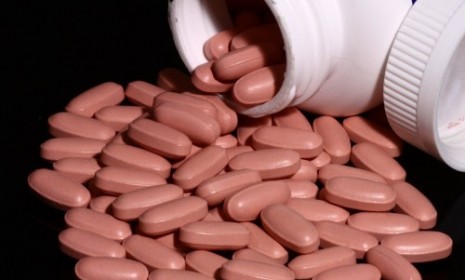Are herbal supplements making you sick?
A new government study finds that many herbal supplements contain lead and pesticides — and are being marketed irresponsibly

A free daily email with the biggest news stories of the day – and the best features from TheWeek.com
You are now subscribed
Your newsletter sign-up was successful
Retailers of herbal dietary supplements are putting "the health of consumers at risk" by falsely claiming that their products can cure cancer and other diseases, according to a new report from the Government Accountability Office — the investigating arm of Congress. The GAO report, released as Congress prepares to consider a landmark food safety bill, also found trace levels of heavy metals, such as lead and mercury, and pesticides in many supplements. (Watch a CBS report about the harms of herbal supplements.) Here's a quick guide to what these findings mean for your health:
How extensive are the problems uncovered in the study?
The GAO found that sellers had made bogus health claims about (at least) nine of the 40 popular herbal dietary supplements included in the study — suggesting, for instance, that ginseng could cure cancer or Ginkgo biloba counteract Alzheimer's. Sixteen of the 40 supplements contained pesticide residues, while 37 out of 40 products contained trace amounts of heavy metals like lead and mercury.
The Week
Escape your echo chamber. Get the facts behind the news, plus analysis from multiple perspectives.

Sign up for The Week's Free Newsletters
From our morning news briefing to a weekly Good News Newsletter, get the best of The Week delivered directly to your inbox.
From our morning news briefing to a weekly Good News Newsletter, get the best of The Week delivered directly to your inbox.
How great are the dangers?
Likely low, in the case of the trace metals. Dietary supplement makers said it's normal for traces of metals and other contaminants to be found in soil and plants. "I don't think this should be of concern to consumers," Steve Mister, the president and CEO of the Council for Responsible Nutrition told The New York Times.
So why the alarm?
The levels of pesticide residue "appeared to have exceeded legal limits," according to The Times. But investigators said the false health claims were the most worrying finding. Sales people at 22 storefront and mail-order businesses dispensed "potentially dangerous advice," in some cases encouraging GAO workers posing as elderly patients to replace much-needed prescription medicine with herbal supplements. The elderly are doubly vulnerable because they are more likely to take many different medicines, some of which could interract with the supplements in ways sales staff aren't warning them about. One seller urged a customer to take Ginkgo biloba with aspirin to improve memory — but the Food and Drug Administration warns that combining aspirin and ginkgo could increase risk of internal bleeding.
A free daily email with the biggest news stories of the day – and the best features from TheWeek.com
How has the industry responded?
Mister told ABCNews.com it was unfair to blame the entire industry for the actions of a few "outliers" who might be breaking the law. "That is certainly not representative of the vast majority of the industry."
Sources: New York Times, ABC News, NPR
-
 The environmental cost of GLP-1s
The environmental cost of GLP-1sThe explainer Producing the drugs is a dirty process
-
 Greenland’s capital becomes ground zero for the country’s diplomatic straits
Greenland’s capital becomes ground zero for the country’s diplomatic straitsIN THE SPOTLIGHT A flurry of new consular activity in Nuuk shows how important Greenland has become to Europeans’ anxiety about American imperialism
-
 ‘This is something that happens all too often’
‘This is something that happens all too often’Instant Opinion Opinion, comment and editorials of the day